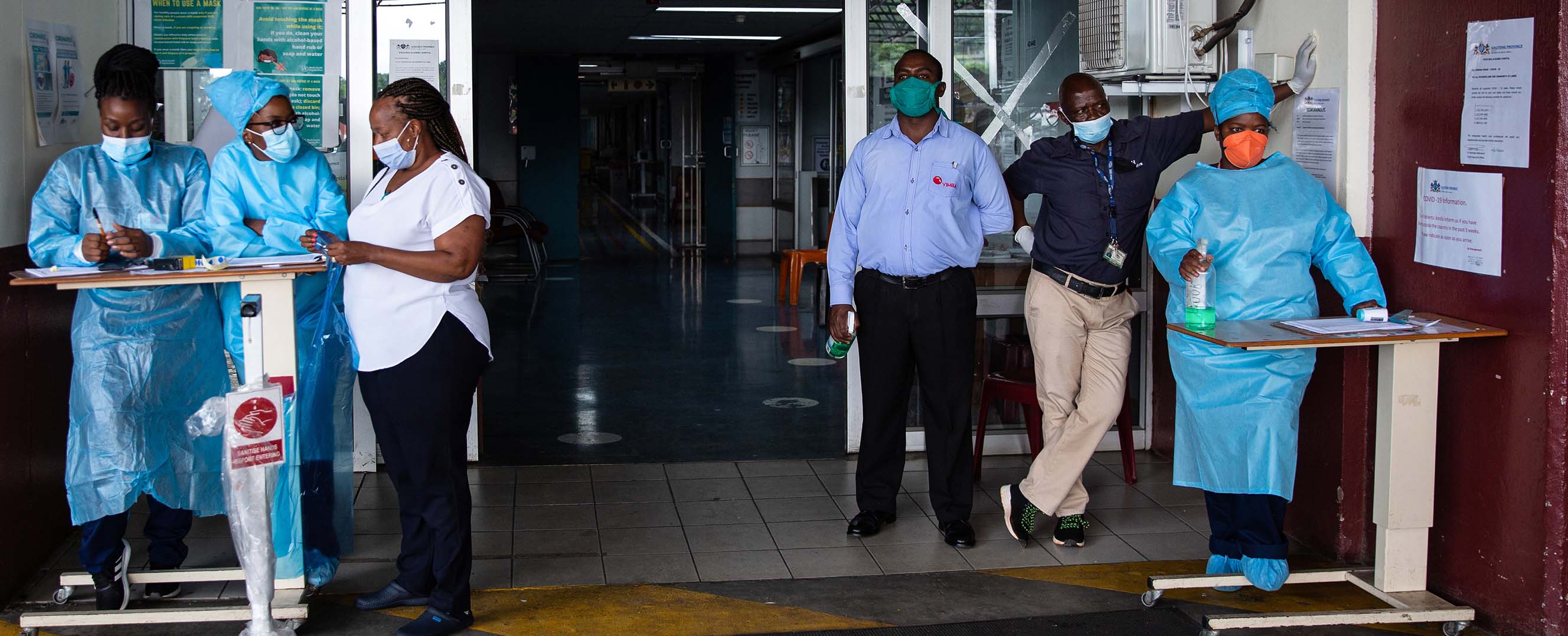Regional solutions are what we need to get us through the next pandemic
We are in the midst of a third wave of COVID-19. In countries able to access vaccines, morbidity and mortality rates have fallen. But in Africa, where less than 3 percent of the population is fully vaccinated, the number of cases per week is at record highs. As of November 3, 2021, there were 8.5 million confirmed cases and over 218,000 COVID-19 fatalities across the continent.
The pandemic has overwhelmed health systems, taking scarce resources away from fending off concurrent epidemics and managing an already high disease burden. This burden is related to factors including rapid population growth; infectious and noncommunicable diseases; high maternal morbidity; and environmental, climatic, and ecological changes. Africa is fighting these battles with about 3 million health care workers—that’s 3 doctors per 10,000 people, compared with nearly 30 for the Americas and more than 40 for Europe.
Homegrown solutions
The 2014–16 Ebola virus outbreak in West Africa provided several lessons. The continent clearly needed stronger surveillance and governance systems and better national pandemic management capacity and capability—in addition to significantly more predictable funding. But to succeed, coordination, communication, and collaboration through the African Union were crucial.
The Africa Centres for Disease Control and Prevention (Africa CDC) has played a pivotal role in coordinating the African Union’s continental response strategy during the current pandemic. The strategy was released less than six weeks after the first confirmed case on the continent and created several unprecedented mechanisms.
The pan-African Partnership to Accelerate COVID-19 Testing was launched by the African Union Commission (AUC) and Africa CDC in April 2020. Because of the vaccine gap, African countries have largely relied on testing to get ahead of the virus. Thanks to the partnership, the number of countries with testing capacity increased from 2 to 43 in just three months. More than 90 million test kits were procured and thousands of lab workers trained.
The African Union partnered with Africa CDC, the United Nations Economic Commission for Africa, and the African Export-Import Bank to create a medical supplies platform. The platform makes it easier for governments to locate and purchase vital personal protective equipment by acting as a one-stop shop for procurement, which has improved Africa’s bargaining power while supporting African manufacturers.
The AUC and Africa CDC also launched the Trusted Travel Platform to simplify the verification of COVID-19 test results and public documentation for travelers. Beyond COVID-19, the system could also be used for the African Continental Free Trade Area.
The African Vaccine Acquisition Trust was established to complement initiatives such as COVAX—a global risk-sharing mechanism for pooled procurement and equitable distribution of COVID-19 vaccines. The Trust has secured enough vaccine doses to cover one-third of the African population.
The case for regionalization
The examples mentioned show that regional institutions have an important role to play that goes beyond backstopping countries. They can innovate and help adapt responses to regional needs, and are close enough to decision-makers to secure the required political support—all important elements of success.
Our work at Africa CDC is guided by the need for a new public health order for Africa and a focus on five core areas for the continent’s mid- to longer-term health security:
- Strong regional institutions to guide priorities, coordinate policies and programs, and drive standard-setting and disease surveillance;
- Local production of vaccines, therapeutics, and diagnostics to drive down procurement costs and increase response speed;
- Investment in the public health workforce and leadership programs;
- Strong, high-level partnerships, including between donors and governments and the public and private sectors and with public health institutions; and
- A greater role for regional organizations in pandemic governance, by decentralizing institutions and through regional representatives in key agencies to ensure that the specificities and needs of each region are considered in the planning of central mechanisms such as surveillance systems.
This new public health order requires more predictable, long-term funding. Funding needed for national public health institutes differs widely based on size, function, and country, but a starting budget of at least $20 million is required. Most important, tens of billions of dollars will be needed to train nurses, physicians, epidemiologists, and other health care workers. Continental manufacturing of vaccines, diagnostics, and therapeutics will also require up-front investments in infrastructure, materials, and staff.
These calculations do not include the additional funding needs identified on a global level. For example, support for global institutions such as the World Health Organization; access to vaccines, diagnostics, and therapeutics; global surveillance and alert systems; and rapid surge funding for (early) response activities.
While there should be more domestic funding, it will not be sufficient for the needs of low- and many lower-middle-income countries, at least not in the foreseeable future. It must be bolstered by favorable financing options, supported by strong partnerships and investments in pandemic preparedness and response, and backstopped by a fund that can pay for surge expenses as needed.
Loading component...
Both the Independent Panel for Pandemic Preparedness and Response and the G20 High Level Independent Panel on Financing the Global Commons for Pandemic Preparedness and Response recommend a global fund. The G20 panel estimates that it will cost at least $75 billion over the next five years to fill gaps in pandemic prevention and preparedness.
People-centered health systems
The continuing threat of COVID-19, the effort to rebuild what has been lost over the past year and a half, and the task of ensuring that the next pandemic is managed more effectively require a fundamental rethink of our approach to global public health.
We need people-centered health systems that are inclusive. Equity starts by regionalizing health systems so that when a crisis hits, regions have the capacity and ability to respond.
COVID-19 is a tragedy whose lessons are too significant to ignore. If we take those lessons learned and translate them into a new public health order, we can lessen the effects of future pandemics on our lives and livelihoods.







